Kirksville (660) 665-9000
August 2023
Treating and Preventing Plantar Warts
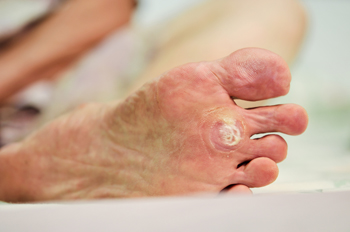
Plantar warts are stubborn growths caused by human papillomavirus, abbreviated HPV, and can be a source of discomfort and frustration. If you are attempting to manage these types of warts, there are effective ways to address them. Over-the-counter treatments containing salicylic acid can help dissolve the warts over time. Alternatively, your podiatrist can use cryotherapy to freeze the warts off. It is important to avoid picking or scratching the warts, as this can spread the virus. To help prevent plantar warts, keep your feet dry and clean, especially in damp environments, such as locker rooms or public showers. Wearing appropriate shoes, such as flip-flops, in communal areas can help to reduce the risk of exposure. If you have developed a plantar wart, it is suggested that you consult with a podiatrist who can guide you toward the treatment method that is right for you.
Plantar warts can be very uncomfortable. If you need your feet checked, contact Deborah Holte, DPM from Northeast Missouri Foot Clinic. Our doctor will assist you with all of your foot and ankle needs.
About Plantar Warts
Plantar warts are the result of HPV, or human papillomavirus, getting into open wounds on the feet. They are mostly found on the heels or balls of the feet.
While plantar warts are generally harmless, those experiencing excessive pain or those suffering from diabetes or a compromised immune system require immediate medical care. Plantar warts are easily diagnosed, usually through scraping off a bit of rough skin or by getting a biopsy.
Symptoms
- Lesions on the bottom of your feet, usually rough and grainy
- Hard or thick callused spots
- Wart seeds, which are small clotted blood vessels that look like little black spots
- Pain, discomfort, or tenderness of your feet when walking or standing
Treatment
- Freezing
- Electric tool removal
- Laser Treatment
- Topical Creams (prescription only)
- Over-the-counter medications
To help prevent developing plantar warts, avoid walking barefoot over abrasive surfaces that can cause cuts or wounds for HPV to get into. Avoiding direct contact with other warts, as well as not picking or rubbing existing warts, can help prevent the further spread of plantar warts. However, if you think you have developed plantar warts, speak to your podiatrist. He or she can diagnose the warts on your feet and recommend the appropriate treatment options.
If you have any questions please feel free to contact our office located in Kirksville, MO . We offer the newest diagnostic and treatment technologies for all your foot and ankle needs.
Understanding Why Women's Heels Crack
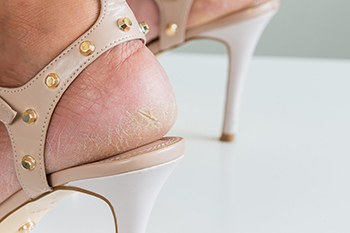
In the intricate world of skincare and beauty, cracked heels is a perplexing issue that often plagues many women. These unsightly and often uncomfortable crevices can leave anyone feeling puzzled and frustrated. The culprits behind this phenomenon, however, are not merely superficial. Dry skin, a common cause, occurs as a result of factors such as climate, footwear choices, and lack of proper moisturization. Additionally, prolonged standing or walking can exacerbate the problem, leading to excessive pressure on the heels. Neglecting foot care routines and failing to keep feet adequately hydrated can also contribute to getting cracked heels. While these factors affect individuals differently, a combination of preventive measures consisting of regular exfoliation, wearing appropriate footwear, and moisturizing can help bid farewell to cracked heels, ensuring that each step is a comfortable and confident one. If you would like more information about cracked heels and effective prevention methods, it is suggested that you consult a podiatrist.
If the skin on your feet starts to crack, you may want to see a podiatrist to find treatment. If you have any concerns, contact Deborah Holte, DPM from Northeast Missouri Foot Clinic. Our doctor can provide the care you need to keep you pain-free and on your feet.
Cracked Heels
It is important to moisturize your cracked heels in order to prevent pain, bleeding, and infection. The reason cracked heels form is because the skin on the foot is too dry to support the immense pressure placed on them. When the foot expands, the dry skin on the foot begins to split.
Ways to Help Heal Them
- Invest in a good foot cream
- Try Using Petroleum Jelly
- Ease up on Soaps
- Drink Plenty of Water
Ways to Prevent Cracked Heels
- Moisturize After Showering
- Skip a Shower
- Keep Shower Water Lukewarm
- Don’t Scrub Your Feet
If you are unsure how to proceed in treating cracked heels, seek guidance from a podiatrist. Your doctor will help you with any questions or information you may need.
If you have any questions, please feel free to contact our office located in Kirksville, MO . We offer the newest diagnostic and treatment technologies for all your foot care needs.
Sesamoiditis and Big Toe Pain
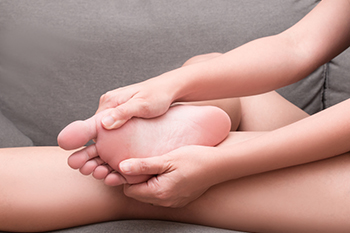
Sesamoiditis is a condition that affects the sesamoid bones, which are located under the base of the big toe. These bones, enclosed within tendons, can become inflamed due to an acute injury or chronic overuse. Other possible causes of this affliction include stress fractures, infection, or autoimmune disorders. Symptoms often include pain during walking, or when forcefully pulling the big toe upwards, causing pressure on the sesamoid bones. Relief may come from wearing shoes with adequate cushioning, using shoe inserts or orthotics, rest, and taking anti-inflammatory medication. If more conservative treatments are not successful, surgery may be an option. If you have pain in your big toe, it is suggested that you make an appointment with a podiatrist for a proper diagnosis and treatment.
Sesamoiditis is an unpleasant foot condition characterized by pain in the balls of the feet. If you think you’re struggling with sesamoiditis, contact Deborah Holte, DPM of Northeast Missouri Foot Clinic. Our doctor will treat your condition thoroughly and effectively.
Sesamoiditis
Sesamoiditis is a condition of the foot that affects the ball of the foot. It is more common in younger people than it is in older people. It can also occur with people who have begun a new exercise program, since their bodies are adjusting to the new physical regimen. Pain may also be caused by the inflammation of tendons surrounding the bones. It is important to seek treatment in its early stages because if you ignore the pain, this condition can lead to more serious problems such as severe irritation and bone fractures.
Causes of Sesamoiditis
- Sudden increase in activity
- Increase in physically strenuous movement without a proper warm up or build up
- Foot structure: those who have smaller, bonier feet or those with a high arch may be more susceptible
Treatment for sesamoiditis is non-invasive and simple. Doctors may recommend a strict rest period where the patient forgoes most physical activity. This will help give the patient time to heal their feet through limited activity. For serious cases, it is best to speak with your doctor to determine a treatment option that will help your specific needs.
If you have any questions please feel free to contact our office located in Kirksville, MO . We offer the newest diagnostic and treatment technologies for all your foot and ankle needs.
How Purines in Your Food Can Cause Gout
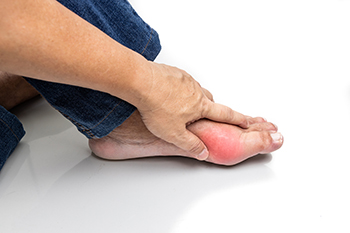
Gout is a form of arthritis and is caused by an overabundance of urates in the system. The urates can form needle-like crystals in the joints, commonly in the big toe. Sudden bouts of extreme pain, swelling, redness, and stiffness develop almost out of nowhere and can last a week or more. They can start at any time and are often experienced at night. Besides genetics and certain lifestyle choices, one of the main causes of gout is eating foods and drinking beverages rich in purines. These can be found in red meat, organ and game meats, and even turkey. The types of seafood that are rich in purines are herring, scallops, mussels, codfish, tuna, and trout. In addition, sugary drinks and foods that are high in fructose contain large amounts of purines. While alcoholic beverages are not high in purines, they can inhibit the kidneys from eliminating uric acid, which furthers the buildup of urates. Gravy and meat sauces, as well as yeast and yeast extracts, are also high in purines. For more information on ways to reduce uric acid and cut back on the effects of gout, it is suggested that you make an appointment with a podiatrist who is trained to deal with this condition.
Gout is a foot condition that requires certain treatment and care. If you are seeking treatment, contact Deborah Holte, DPM from Northeast Missouri Foot Clinic. Our doctor will treat your foot and ankle needs.
What Is Gout?
Gout is a type of arthritis caused by a buildup of uric acid in the bloodstream. It often develops in the foot, especially the big toe area, although it can manifest in other parts of the body as well. Gout can make walking and standing very painful and is especially common in diabetics and the obese.
People typically get gout because of a poor diet. Genetic predisposition is also a factor. The children of parents who have had gout frequently have a chance of developing it themselves.
Gout can easily be identified by redness and inflammation of the big toe and the surrounding areas of the foot. Other symptoms include extreme fatigue, joint pain, and running high fevers. Sometimes corticosteroid drugs can be prescribed to treat gout, but the best way to combat this disease is to get more exercise and eat a better diet.
If you have any questions please feel free to contact our office located in Kirksville, MO . We offer the newest diagnostic and treatment technologies for all your foot and ankle needs.
Are You Suffering From Ingrown Toenails?
The Impact of Psoriatic Arthritis on the Feet and Ankles
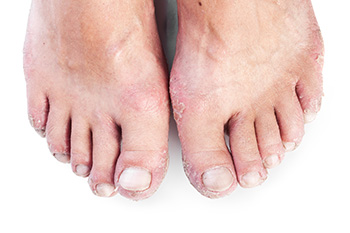
Psoriatic arthritis, or PsA, is a type of inflammatory arthritis that can manifest in individuals with the autoimmune skin condition psoriasis. This form of arthritis primarily affects the feet and ankles, bringing about inflammation and pain in the joints and supporting structures. PsA is frequently associated with various other foot conditions, including Achilles tendonitis, dactylitis, and plantar fasciitis. Achilles tendonitis is characterized by a painful inflammation of the tendon connecting the calf muscles to the heel where it attaches to the heel bone. Dactylitis involves severe inflammation around the toe joints, leading to swelling that gives the toes a sausage-like appearance and induces rigidity and pain when flexing. Plantar fasciitis refers to inflammation where the plantar fascia attaches to the heel bone, causing discomfort and hindrance in movement. As PsA progresses, it can significantly impede walking and performing daily activities, imposing substantial discomfort and limiting one's ability to engage in regular life pursuits. A cure for PsA does not exist yet, but various treatment options are available to manage the condition, slow its progression, and alleviate the associated symptoms. If you suspect or experience symptoms indicative of psoriatic arthritis, it is strongly suggested that you seek help from a qualified podiatrist for a proper diagnosis and personalized treatment.
Arthritis can be a difficult condition to live with. If you are seeking treatment, contact Deborah Holte, DPM from Northeast Missouri Foot Clinic. Our doctor can provide the care you need to keep you pain-free and on your feet.
Arthritic Foot Care
Arthritis is a joint disorder that involves the inflammation of different joints in your body, such as those in your feet. Arthritis is often caused by a degenerative joint disease and causes mild to severe pain in all affected areas. In addition to this, swelling and stiffness in the affected joints can also be a common symptom of arthritis.
In many cases, wearing ill-fitting shoes can worsen the effects and pain of arthritis. Wearing shoes that have a lower heel and extra room can help your feet feel more comfortable. In cases of rheumatoid arthritis, the arch in your foot may become problematic. Buying shoes with proper arch support that contour to your feet can help immensely.
Alleviating Arthritic Pain
- Exercises that stretch the foot can prevent further pain and injury and increase mobility
- Most of the pain can be alleviated with anti-inflammatory drugs, heat, and topical medications
- Massages can help temporarily alleviate pain.
It is best to see your doctor for the treatment that is right for your needs and symptoms. Conditions vary, and a podiatrist can help you determine the right method of care for your feet.
If you have any questions, please feel free to contact our office located in Kirksville, MO . We offer the newest diagnostic tools and technology to treat your foot and ankle needs.





